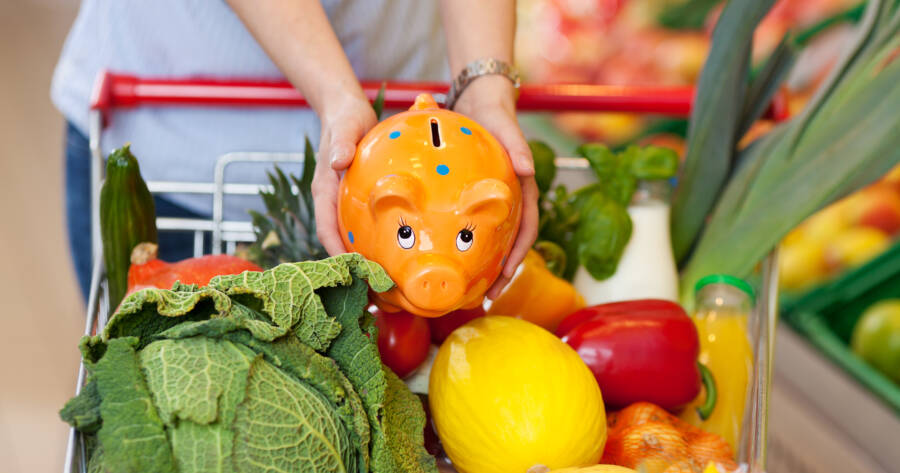Food falls under “mandatory spending” in personal finance—we all have to eat. From a money management standpoint, buying groceries is far more cost-effective than eating out, yet grocery stores are full of subtle tactics designed to make shoppers spend more. With a bit of knowledge and strategic planning, it’s entirely possible to reduce your household grocery bill significantly while still eating well.
1. Plan Your Meals in Advance
One easy way to avoid overspending is to have a plan in place the minute you walk into the grocery store, and stick to it. For many people, that means making a grocery list before heading to the supermarket. That works well, but you can take things to a whole new level by putting together a weekly meal plan.
List out everything you’re going to make for breakfast, lunch, and dinner over the course of the week. Check your fridge and cupboards to see what you already have, then add the things you need to a master list. When you go to the supermarket, buy only the things on your list. You’ll eat well while eliminating excess and unnecessary spending.
2. Use Coupons
Coupons are your friend: they deliver valuable discounts on popular items and everyday products. You can find them online or in grocery store flyers available in-store if they aren’t delivered right to your door with your newspaper or bulk mail. Make checking the current coupon offerings a regular part of your shopping routine, and you could see your supermarket spending fall.
3. Avoid Prepared foods
Prepared meats and prepared meals are major money wasters, but you’ll also notice that items like shredded cheese, cut vegetables, and other pre-packaged goods are also much more expensive on a per-pound basis.
The same is usually true of canned fruits and vegetables, frozen potatoes, and other frozen vegetable products. Instead, do the work yourself: shred your own cheese, cut your own veggies, slice and dice your own fruits, and cook your own meals. Your wallet will thank you.
4. Look For Generic Alternatives
Brand-name items have their appeal, but store brands and off-label alternatives will vault your savings to new heights. Give them a try. Chances are, you won’t even notice the difference most of the time.
You don’t have to give up brand names altogether. If there’s a particular breakfast cereal, snack food, soft drink, peanut butter, or coffee you just can’t live without, allow yourself a little splurge. However, it’s a good idea to introduce limits. Identify one or two brands you strongly prefer and make them the only ones you buy.
5. Take Advantage of Sales
This tip is most readily applied to meat: look for products that are marked for clearance. Grocery stores typically reduce the price of meat a couple of days before it’s due to expire in order to get it out the door. If you freeze it when you get home, you’ll save money without sacrificing anything. You can apply a similar strategy to fresh produce, but you’ll have to be a little more strategic about it. Don’t buy more than you’ll go through within a couple of days, since it’s probably closer to spoiling than regularly priced fruits and veggies.
If you do want to buy brand-name products, wait for them to go on sale. Most major grocery stores publish weekly flyers that detail their best bargains. Consult them before you start shopping to figure out where to look for savings.
6. Never Shop When You’re Hungry
This psychological trick will help you avoid overloading your cart. When you go to the grocery store hungry, everything looks good. You’ll grab items on impulse and, in most cases, you’ll spend more than you initially intended (and much more than you need to). Instead, satiate your hunger with a snack or a sandwich before going shopping. You’ll have more focus and restraint.
7. Stay on the Perimeter
Grocery stores are usually configured to keep the healthiest and most affordable items around the perimeter, while the inner aisles are stocked with prepared foods and products with high mark-ups. Avoid heading into the grocery store’s inner reaches and instead stick to the perimeter. You’ll find all your essentials while also avoiding processed foods and empty-calorie items.
8. Buy Toiletries at the Pharmacy
Picking up shampoo, shaving cream, deodorant, moisturizer, and other toiletries at the grocery store is definitely convenient, but it’s also costly. Supermarkets usually add a premium to the price you would pay in a pharmacy for the same items. Unless you’re totally strapped for time, buy your toiletries at the drugstore instead.
A similar strategy extends to household items like cleaning products, garbage bags, and dishwashing liquid or detergent. You’ll find cheaper options at discount stores and dollar stores, so try to buy them elsewhere instead of stocking up at the supermarket.
9. Look Beyond Eye Level
Grocery stores use a sneaky trick to entice consumers to buy items that deliver the best profit margins: they place them at eye level on shelves. This keeps them within easy reach, a subtle trick that encourages people to buy them more often. To find savings, look up to the shelf’s higher reaches or down to the bottom. That’s where the more affordable alternatives are.
10. Ditch the Bottled Water
Bottled water is one of the worst culprits when it comes to unnecessary grocery spending, since you (hopefully) have unlimited access to a quality alternative: your faucet. You’ll also do your part to help cut down on the massive amount of plastic waste the bottled water industry generates. One exception applies to babies being fed formula, as many pediatricians recommend using bottled water rather than tap water to make milk for infants.
11. Don’t Take The Kids
If possible, leave the kids at home when you go to the grocery store. This will help you cut back on impulse items, which you might load into your cart just to stop children from complaining. As an added benefit, you’ll also have an easier time steering clear of sugary and salty junk food, which will help your kids stay healthier.
12. Stick With Stores You Know
This pro tip will really come in handy if you’re short on time or stressed out. Navigating an unfamiliar grocery store when you’re in a rush will almost inevitably lead to spending more than you planned, since you won’t have the time to search for optimized prices. Instead, stick with a store you shop at regularly, as you’ll already know where to find familiar money-saving products.
Final Thoughts
If you’re not sure where to begin saving on groceries, most personal finance insiders recommend making shopping lists and meal plans as the best starting points. These smart money management techniques help give shape and structure to your shopping trip, which is the key to saving. Also, don’t be shy to give new foods and products a try: you could stumble upon a new favorite that helps you save money by replacing a more expensive item on your regular grocery list.








